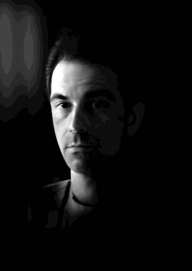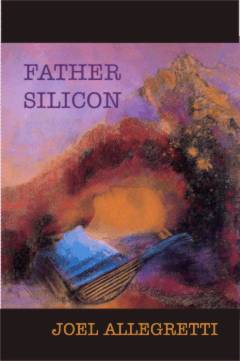THE BAUDELAIRE OF THE PALISADES...

Joel Allegretti was born and raised in New Jersey, where he still lives. His work has been anthologized and nominated for a Pushcart Prize. He was one of three writers selected to participate in the inaugural Visible Word, a collaboration of literary and visual artists sponsored by the DeBaun Center for the Performing Arts of Stevens Institute of Technology. He performs frequently as both poet and musician in the New York and New Jersey poetry scenes.
Most recently, Joel was editor of Rabbit Ears, an acclaimed anthology of television-themed poetry.
DOXOLOGY
Be a cathedral
for me,
with vaulted ceilings
that house the praise-misted air
and a canticled soul
recumbent in the choirloft
amid the psalmody of flute-throated boys.
Be an unrepentent whore
for me,
a ragged baggage
whose bloated thighs
crackle with disease,
who says,
“This is my body, this is my blood,”
as the fleas rouse themselves to feast.
Be a harp of David
for me,
with prayer-plated strings
tempered in the heat of the first Breath,
which brought waves
to oceans
and orbits
to moons.
Be a creature of Hell
for me,
a baying goat-footed thing,
viper-tailed
and salmon-scaled,
whose pustulant tongue froths
with the renunciation of grace.
Be a paraclete for me,
a Christ-eyed mercy bearer,
and plead my case in dove tones
before an eternity-scented jury
that counts my wrongdoings,
sin by measured sin,
upon an abacus of gallstones.
THE LAST MOOR DEPARTS FROM SPAIN
AND REFUSES TO MOURN
By the morning hours
And by the night when it is stillest,
Thy Lord hath not forsaken thee nor doth He hate thee.
The Koran
But the night has discarded
the crescent moon,
and none but the cicadas
call me to prayer
on this morning.
The finger cymbals have ceased
to ring
for the hips of dancers.
The lutes have slackened
their strings;
Rabat has reclaimed
their courting songs.
A bewildered wind prowls
the Alhambra’s barren warrens
in search of a virgin’s hair
to rustle.
O Seville!
O Cordoba!
O Granada!
Your names
have become names,
and names alone!
A priest strings olives
into a rosary.
A rabbi eats
his phylacteries.
A lamb lifts its head
from the chopping block
and bleats toward Rome.
My walls reflect
the quiet flicker
of votive candles.
I go to my knees,
kiss the soil,
and I cut my lips
on my grandfather’s skeleton.
A ship waits in the harbor,
rocking,
rocking,
rocking,
returning.
I climb to the bow,
I close my eyes,
and I listen.
I listen.
I listen.
I hear …
A pig grunting in the marketplace.
THE SINGER
I sang for the winds,
And the winds fled sails,
Fled trees,
And carried my echo to Egypt.
I sang for the nightingales,
And the nightingales in fury
Smashed their beaks
Because their song could not compete.
I sang for the cobra,
And the cobra, with withered hood,
Bared its fangs
And dulled them against the rocks.
I sang for the beggar,
And the beggar, concealing his sores,
Overturned his cup
And offered me his alms.
I sang for the lovers,
And the lovers, hearing me sing,
Broke their embrace
And sweetened my linens at dusk.
I sang for the physician,
And the physician emptied his flasks
And showed his patients
The way to my room.
I sang for the Lord,
And the Lord singed my tongue,
Because I sang for others
Before I sang for the Lord.
ELEGY FOR ERIK,
ARCHITECT OF HOPELESS DESIRE, ANGEL OF MUSIC,
OPERA HOUSE POLTERGEIST
You see, Christine, some music is so terrible
that it consumes everyone who approaches it.
Gaston Leroux, “The Phantom of the Opera”
What you longed for most
was a lady's lap on which to lay
the disgrace of flesh.
She did not have to be beautiful.
She did not have to possess
mansions or carriages.
Only pity
and yes,
a soul that celebrated music.
Her fingers did not require
the adornment of rings
or manicured cuticles.
They only had to be gentle
and yes, loving,
slipping backward along the contours
of your benighted skin
the way you drew the bow
across the violin to play
your sonatas of seduction.
And yes, she would have had to sing to you,
but not a Gounod aria or the Magnificat.
Only a lullaby
or perhaps even
(Oh Erik, how your heart would
have danced if it were so!)
a wedding song.
In Rouen,
where you fled the solace of the womb,
the song of the day was a dirge.
It rained that morning,
and your mother
(what a delightful, pretty thing
she was before you came, Erik)
your mother said so calmly
as you cried for a nourishing breast
that it was only God spitting in her eye.
In Nizhni Novgorod,
where you fled the denial of her kisses,
the song of the day was an anthem.
You created magic,
Magic, Erik,
and tales of your illusions
echoed in the desolate caravan nights
like the hooves of chamoix
pounding the wild steppes.
In Persia,
where your legend teased a sovereign's fancy,
the song of the day was a tasnif.
You created mazes and mayhem,
Mazes and mayhem, Erik,
wicked amusements to jade
the whimsies of a bored king.
But even the monarch's favorite
must know that privilege can wither
like a petal torn from the pomegranate.
You had to flee, Erik,
Flee by night.
May Allah guide and protect you.
In Paris,
where your grave patiently waited,
the song of the day was a requiem.
It was your funeral song, Erik,
Sad, wretched Erik,
A Gallic Job in a satin cape and linen mask,
dwelling in shadows and subterranean alcoves,
tutoring the ungrateful Christine,
blessing that unworthy pupil
with the full measure of your mastery.
Dreadful, devil-faced Erik,
whose nobility shriveled on his lips
when his mother turned away her delicate cheek,
whose music was the lone sobbing
of a battered, battered heart.
Who writhes in Hell, Erik?
Who is there, charred in those chaotic fires,
to match you for hopelessness?
All you wanted was a lady's lap
on which to lay the disgrace of flesh.
The evening is luminous,
Luminous with larks and comets.
It resounds with sanctus bells.
There are candles.
There are angels.
Angels, Erik.
Tens upon hundreds
upon thousands of angels.
Angels with starlit wings,
Wings that scrape the planets
to make them spin.
Can you hear the angels, Erik?
Lift your tired, unhappy head
this one last moment and listen.
Listen, Erik.
The choirs sing for you.
God is good,
God is great,
God is just,
God is kind.
Au revoir,
Monsieur l'Ange de la Musique.
Dormiez bien dans le berceau de l'eternite.
Au revoir.
(Goodbye,
Mr. Angel of Music.
Sleep well in the cradle of eternity.
Goodbye.)
To buy this poet's books...

JOEL ALLEGRETTI. FATHER SILICON.
Here is one of the most startling books of poetry since
Baudelaire. Joel Allegretti, author of The Plague Psalms, has
been up to no good since his first book, and this new book goes darker
and deeper still, delving into such delicate topics as The Juggernaut,
Mother Julian of Norwich, Eurydice as Greta Garbo, Nico, spiders, the
Gallows Tree, the horrors of 9/11, and "Billy the Whore: An Encomium in
9 Infections."
Father Silicon was picked by The
Kansas City Star as one of the ten most notable poetry books of
2006. Published 2006; third printing 2009. 72 pages,6.5 x 10.25" ISBN 0-922558-18-3, $13.95.
 JOEL ALLEGRETTI. THE PLAGUE PSALMS.
JOEL ALLEGRETTI. THE PLAGUE PSALMS.
Joel Allegretti's dark and Gothic collection of poems,
The
Plague Psalms, has gone through two editions — a hand-bound
edition, including some copies on exotic hand made papers (the black
"Dominican" binding was popular, second only to the flesh-toned "human
skin" binding) — followed by a deluxe hardcover binding done by Acme
Bookbinding in Boston.
A new, third, paperback edition has been issued, including all the color content from the original limited edition.

 JOEL ALLEGRETTI. THE PLAGUE PSALMS.
JOEL ALLEGRETTI. THE PLAGUE PSALMS.
